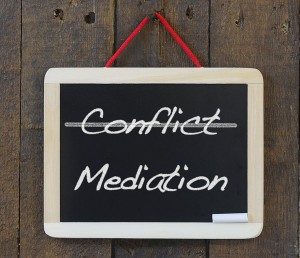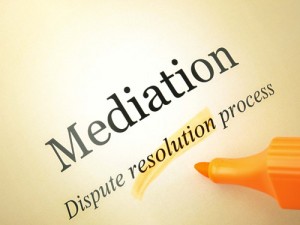About Mediation
In the UK and Europe, facilitative mediation is increasingly used as an alternative dispute resolution method, helping to reduce litigation, court time and costs. Courts and other interested parties often expect mediation to be considered before initiating court proceedings, and it is likely that mediation or other forms of dispute resolution may soon become compulsory for certain disputes. The Civil Mediation Council (CMC), a charitable organisation, offers guidance on mediation standards and processes, and registers providers of mediation services. Mediators are expected to adhere to a Code of Practice, such as the European Code of Practice, ensuring consistency and professionalism.
 Mediation Structure and Agreement
Mediation Structure and Agreement
Mediation is a structured process led by a trained mediator to help disputing parties reach a mutually agreed settlement. Before mediation begins, a mediation agreement must be signed by all parties and the mediator. This agreement is crucial as it lays the foundation for the mediation, covering details such as the names of the participants, the mediator’s role, mediation dates, venue/platform and method. It also incudes confidentiality rules, the destruction of documents post-mediation, fees, payment terms and jurisdictional details. The mediation cannot proceed without this signed agreement, which provides a clear and safe framework for all parties involved.
Role of the Mediator
The mediator’s role in facilitative mediation is strictly neutral. The mediator does not act as a Judge, lawyer or arbitrator, nor do they assess the merits of the dispute or offer recommendations. Instead, they facilitate the process by encouraging open communication and helping the parties explore options. The mediator might use techniques such as reality testing and probing questions, but they never impose their views or influence the outcome. The settlement, if reached, is entirely determined by the participants.
Termination of Mediation
Mediation can end when a settlement is reached, by mutual agreement to stop the process, or hen the allotted time expires without an extension. The mediator can also terminate the mediation without explanation if it becomes clear that a settlement is impossible, or under specific circumstances such as fraud, ethical conflicts, threats of violence or inappropriate behaviour.
Settlement Agreement
If a settlement is reached, it must be recorded in writing by the participants themselves. The mediator does not draft or sign the settlement agreement, which must be signed by all parties and clearly state the agreed outcome. If legal documents are needed later, this should be noted in the settlement agreement. Alternatively, parties may agree on non-binding terms or heads of agreement.

Post-Mediation
Although most cases are resolved through mediation, and some of then are often solved after mediation has taken place, unresolved disputes will revert to their previous methods, such as court proceedings.
What is Mediation?
Mediation is a structured, interactive negotiation process facilitated by an impartial third-party known as the mediator. The mediator assists disputing parties in resolving conflicts through specialised communication and negotiation techniques.
As a “party-centered” process, mediation focuses on the needs, rights and interests of the involved parties.
parties.
The mediator’s role is to guide the process constructively, facilitating open communication and helping the parties negotiate to reach a settlement or resolution. This process encourages active participation from all parties, potentially reducing the time and costs associated with litigation and court proceedings.
Mediation can be used to resolve all types of disputes including:-
• Professional Negligence
• Personal Injury
• Family Matters
• Breach of Contract
• Money Disputes
• Wills/Probate Disputes
• Property Disputes including land, landlord/tenant, neighbour
• Workplace
What are the benefits of mediation?
Mediation is confidential.
The decision to enter mediation often arises when previous negotiations have failed or when there are concerns about the potential costs and time involved in prolonged litigation. Courts and other bodies increasingly suggest mediation as a means to simplify the process and avoid lengthy court cases.
It is crucial that both parties approach mediation with an open mind and a willingness to reach a settlement.
In most types of mediation, if a resolution is agreed upon, a written ‘settlement agreement’ will be signed, detailing the terms of the agreement. For civil disputes, this signed agreement serves as a legally binding contract.
If court proceedings are already underway, a court order reflecting the mediated agreement can be made with the consent of the parties involved, known as a ‘consent order’ or a ‘Tomlin order’.
Mediation boasts a high success rate, with the majority of civil disputes being resolved either on the day of the mediation or shortly thereafter.
Who attends the mediation, where and how does the mediation take place?
In addition to the disputing parties, careful consideration must be given to who else should attend the mediation. Parties may be represented not only by individuals with knowledge of the dispute but also those with the ultimate responsibility and authority to settle the case and make financial or strategic decisions. This may include solicitors, barristers, or other legal representatives. The party will determine who will speak on their behalf.
In complex cases, there may be a need for access to expert reports or the presence of an expert to advise the party and support their case during mediation. Some parties may also choose to have a friend or relative present for support.
In certain situations, mediators might request that another mediator or professional observe the session as part of their continuous professional development. This is done only with the permission of the parties involved. The observer will not participate in the mediation and will adhere to the same confidentiality requirements.
Mediation typically occurs at any point before a hearing or when parties are unable to reach an agreement without intervention.
Mediations are often conducted online, providing a safe, private and supportive environment for all parties involved.
Mediators with Clinical or Medical Negligence and Personal Injury Experience
FHC has a number of accredited mediators with varying backgrounds. Many parties feel that the use of a mediator with a related background to their dispute is helpful however, we understand that sometimes parties may prefer a general mediators as they will come without any prior medical knowledge.
Is the mediation legally binding?
You can request with the court for an agreement to be legally binding. A further fee (approximately £45.00-£55.00) will be charged, subject to the mediation dispute.
Once an agreement is reached during mediation, the mediator will document the joint proposals in writing. This allows you to review the terms with a legal adviser before formalising the agreement. You can either establish it as a contractual Separation Agreement between the parties or request court approval in the form of a Consent Order.
 If your agreement pertains to the detailed arrangements for your children, a Statement of Outcome can be produced to formalise these arrangements.
If your agreement pertains to the detailed arrangements for your children, a Statement of Outcome can be produced to formalise these arrangements.
For mediations involving property and finance, a Memorandum of Understanding can be prepared at the conclusion of the process. This document details the agreed-upon-proposals, including the reasoning behind them. The Memorandum provides a clear summary of your current and proposed future financial situations, as well as the practical implications of the agreements reached.








